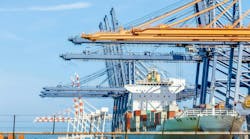Ocean cargo container security ranks as the No. 1 concern among executives responsible for supply chain operations at large global import and export companies, according to research conducted by management consulting firm A.T. Kearney, in collaboration with the International Cargo Security Council (ICSC).
Survey respondents believe that new technology solutions, such as radio frequency identification (RFID)-enabled smart boxes, could enhance container security as well as improve container visibility throughout the supply chain, which could also address their other major concerns about supply chain efficiency.
After security, respondents are mostly concerned about reducing inventories, lead-time variances, stock-outs and preventing the loss of containers. Participants, including ICSC members, were from the retail and consumer packaged goods, chemicals, automotive and high-tech industries, representing companies that account for 29% of U.S. imports.
“All along the supply chain economic security and physical security are directly linked,” says Omar Hijazi, an A.T. Kearney principal who oversaw the report. “It now makes good business sense to improve security using advanced technologies such as RFID because of the associated benefits in operational and administrative efficiency. We found that most companies were already building a solid business case for deploying advanced technologies to solve the new-age issue of security and the age-old issues of reliability and efficiency.”
“Governments, shippers, carriers, service and solution providers must put aside their sometimes differing issues and work together when they share common issues around cargo security and efficiency,” says Joe Baker, ICSC’s executive director.
The study points out that container shipments account for 90% of world trade, are growing at a 5% compound annual rate, and an average of about 14 containers come into U.S. ports every minute. Today, about 95% of these containers are not inspected for weapons of mass destruction or other types of security threats. One chemical executive says that for certain import and export products, his company is willing to do “whatever it takes to guarantee container security.”
“Unreliable data,” caused by manual entry and disparate information systems, emerged as an underlying theme of the respondent’s concerns. Says one retail executive, “Sixty to 65% of my data regarding container movement is timely and accurate. The 35 to 40 % of remaining data is missing or inaccurate.”
The respondents were asked to rank and quantify the potential operational and security benefits of receiving more accurate and timely data, such as could be provided by smart boxes equipped with RFID devices within an information network. The study found a total average benefit of $1,150 per container journey, with most of that coming from the savings of tightening supply lines.
The study found that in recent years most executives had focused the bulk of their resources on improving their domestic (U.S.) supply chains. However, in the post-9/11 world, their companies are increasingly turning their attention to new technologies that can help them improve the security and efficiency of their over-ocean supply chains, and to conform with government programs such as the Customs Trade Partnership Against Terrorism (C-TPAT), which has encouraged the use of smart boxes for faster clearance through U.S. Customs and Border Protection.
Click here for a copy of the report:
www.atkearney.com/main.taf?p=5,3,1,98


